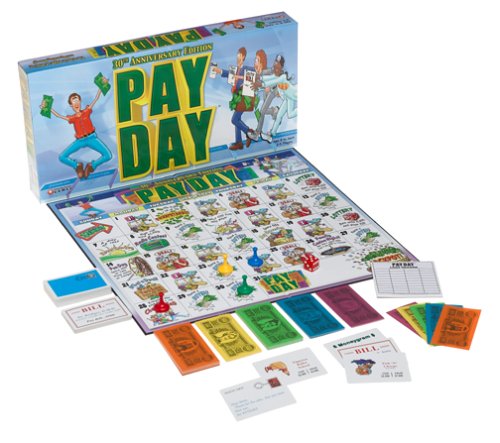One of the best board games I can remember playing as a child is Pay Day.
I have a sneaking suspicion, however, that a lot of board games were simply economic learning tools disguised as games to teach children how to properly manage money. This theory can be backed up somewhat by the sheer number of board games involved with handling money. Between Pay Day, Monopoly, The Game Of Life (that one I think is just a dead giveaway considering the title), and a lot of other more obscure games like Big Money, Easy Money, Allowance, Shopping Spree and a game literally just called Budget, because why try and hide something that obvious I suppose, it's pretty cut and dry, to me at least, that that's what some of these were aiming for. And while education and entertainment have long since been intertwined - Schoolhouse Rock, anyone? - this doesn't really come as a shock, but I will admit...playing these board games didn't teach me a goddamned thing about money management. I am just as bad with money today as I was as an eight year old girl.
Despite that, I still remember really enjoying Pay Day as a whole. Sure, it didn't teach me anything, but neither did school, so really who cares. It's not like I grew up in the era where they had a check writing class or taught you how to balance a checkbook. Nope. Didn't get that or woodshop or home ec or really anything that would've better prepared a kid to go out into the world and succeed. Actually, come to think of it, all I really got out of school was lousy self esteem.
Pay Day was actually originally made by the Parker Brothers, who, despite their name, are actually not a rhythm and blues duo, but that company is now a subsidiary of Hasbro, like most everything in the board game industry. It was created in 1975 by Paul J Gruen of West Newbury, Massachusetts. He was actually one of the eras top board game designers, along with his brother in law, Charles C Bailey. The game simulates money management (I know, I know, what a shock, who could've predicted this) with the game board actually resembling a calendar month. Before the game begins, the players decide on how many months should be played, and during the game, accumulate bills and expenses along with their monthly wage on "pay day" at the end of each month. The winner is the player who has the most money at the end of the last month of play.
These people really expected children to be capable of budgeting their fake lives when they couldn't even figure out what channel Cartoon Network was on. That's a lot of faith to put into a kid, man. But the board game is actually a pretty cool looking design. I mean, a lot of board games simply were stuck with wacky creative layouts, always just something with shapes and colors, nothing really interesting, but Pay Day eschewed all that by deciding to actually have the game board resemble something that related to the game itself. Cool concept. And while there's many other games that did this obviously, especially the bigger name ones, I think Pay Day is one of the cooler looking, because it really is just a calendar. Plain, simple, elegant and yet entirely understandable.
Gruen actually died in 93, at the age of 53, and really Pay Day seems to be his most popular game. However, while researching the man I did discover that in 1994, a year after his death, another game he designed was released posthumously, titled "Turtle Recall". Considering the movie "Total Recall" came out in 1990, I almost guarantee this is a reference, and considering the game is made mostly for children between the ages of 3 and up, I find this endlessly fucking hilarious. In fact, I kind of wanna petition for a remake of Total Recall now but filmed entirely with turtles in the main cast, and have it be done ultra seriously. What a goddamned riot that would be. Anyway Pay Day was one of the few board games my stepsiblings and I played the hell out of. We had an entire closet full of games, but Pay Day was one of the few we just kept coming back to, for whatever reason. I think it's because, unlike other games like it, like Monopoly for example, it wasn't tedious and boring. It was a fairly fast paced, entertaining game. It was also, despite being a money management game of sorts, fairly simplistic game. It didn't have a whole lot of rules or regulations, again, like Monopoly. This really helped its replay value, because we never got burnt out on the complexity it delivered.
I think Pay Day deserves its place in the lineup of classic board games, and quite frankly given its unique board design, deserves a lot more recognition than it currently seems to get. It's a game board whose design is actually consistent with the game itself, and it's not so overwhelmingly dull despite being about money management that it'll put you to sleep or send you into an anxiety attack about your actual personal finances. Pay Day is a top notch board game, and that's a fact. Just please don't take the assumption that it'll actually teach you or your child a single thing about money.
Now if you'll excuse me, I need to go sob about my horrifying credit card debt.


Comments
Post a Comment